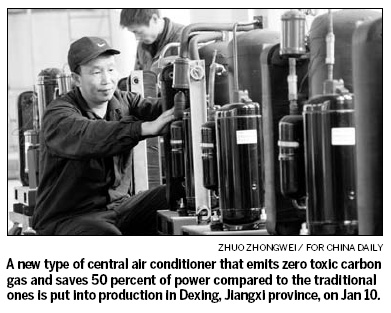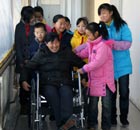Economy
Time running out on energy goals
By Li Jing (China Daily)
Updated: 2010-03-04 07:25
 |
Large Medium Small |

BEIJING: China faces a tough road to bring its energy consumption down by 20 percent, with less than a year left to reach the target set in the 11th Five-Year (2006-10) Plan, experts and policy researchers said.
| ||||
China planned to reduce energy intensity by 20 percent between 2006 and 2010. Figures for the first four years are expected to be published during the annual sessions of the National People's Congress and the Chinese People's Political Consultative Conference National Committee.
China Energy Group at US-based Lawrence Berkeley National Laboratory said in a recent report that China is "well on track" in some nationwide energy conservation programs, such as improving energy efficiency at the country's top 1,000 enterprises, closing down outdated and small-scale plants, enforcing new energy standards for buildings, etc.
For instance, China has already fulfilled its target to close down small-scale coal-fired power plants with a total capacity of 50 million kW by the end of 2009, one and a half years ahead of schedule, according to the National Development and Reform Commission, the country's top economic planner.
However, the slow progress of adjusting economic structure remains a major challenge, according to Feng Fei, director of the Research Department of Industrial Economy under the Development Research Center of the State Council, who predicted "an extremely tough year ahead" to reach the goal.
For instance, the share of heavy industries in the gross value of industrial output has surpassed 70 percent, the highest since 1959, according to Feng.
With rapid industrialization and urbanization, China's energy consumption over the past decade has soared from the equivalent of 1.39 billion tons of coal to an estimated 3.1 billion tons in 2009, Feng said.
"Last year, China launched a massive stimulus package to tackle the global economic crisis, but meanwhile, some energy-intensive industries, such as cement, iron and steel, also got a boost, making it more challenging for China to fulfill the goal this year," said Feng.
Some experts have said China's long-established industrial structure, dominated by coal-fuel heavy industries, shows that its current energy consumption model will be difficult to change in a short period.
"What contributes to the dominant presence of heavy industry in the first place is the under-pricing of factors of production, such as electricity and water, which are heavily subsidized," said Julian L. Wong, senior policy analyst at the US-based Center for American Progress.
To spur a shift away from heavy industries, China must accelerate existing efforts to reform energy and water pricing, Wong said.










